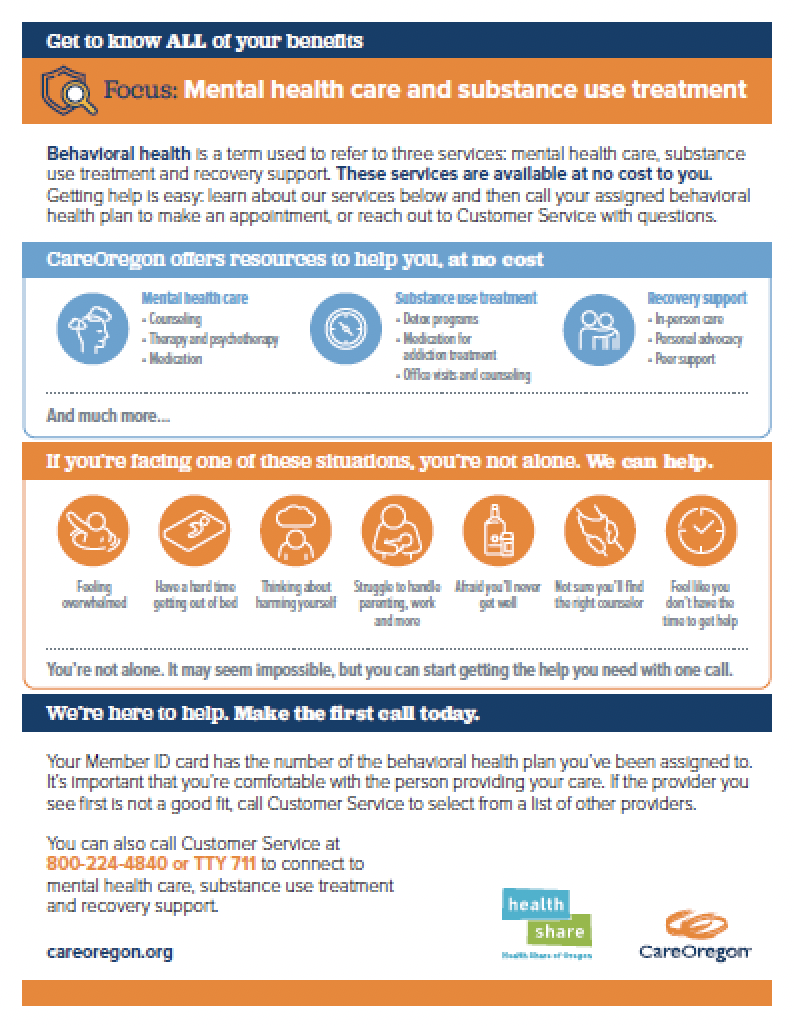Mental health and substance use treatment services are covered by CareOregon
If you’re already enrolled in the Oregon Health Plan (OHP), your benefits include most mental health services, including:
- Substance use treatment
- Counseling
- Psychotherapy/therapy
- Detox programs
If you’re not currently enrolled in the Oregon Health Plan, visit One.Oregon.gov to find out if you’re eligible
and apply for benefits.
Find a provider

Learn about mental health care and substance use treatment
Behavioral health is a term used to refer to three services: mental health care, substance use treatment and recovery support. These services are available at no cost to you. Getting help is easy: click on a link below to view our mental health care and substance use treatment handout, which helps explain these services:
Get crisis care
If you are experiencing a mental health crisis, please call one of the following numbers:
- In Clackamas County: 503-655-8585
- In Multnomah County: 503-988-4888
- In Washington County: 503-291-9111
You can visit one of the following locations for urgent mental health treatment:
COVID-19 update: Walk-in services may be temporarily interrupted due to COVID-19 restrictions. Please contact walk-in clinics by phone prior to going in person.
Cascadia Urgent Mental Health Walk-in Center (Multnomah County)
7 a.m. to 10:30 p.m. every day
4212 SE Division St, Suite 100
Portland, OR 97206
503-963-2575
Clackamas County Urgent Mental Health Walk-in Clinic
9 a.m. to 7 p.m. Monday-Friday, 10 a.m. to 7 p.m. Saturday and Sunday
11211 SE 82nd Ave, Suite O
Happy Valley, OR 97086
503-742-5335
Hawthorn Walk-in Center (Washington County)
9 a.m. to 6 p.m. Monday - Friday, 12-4 p.m. Sunday
Walk-in services are currently not available on Saturdays.
Please call the Washington County Crisis Line at 503-291-9111.
5240 NE Elam Young Pkwy
Hillsboro, OR 97124
Local crisis services
Clackamas Country Crisis Line
Call: 503-655-8585
TTY: 800-735-2900
Multnomah Country Crisis Line
Call: 503-988-4888 or 800-716-9769
TTY: 503-988-5866
Washington County Crisis Line
Call: 503-291-9111 or 800-995-0017
TTY: 800-735-2900
Oregon Warmline
800-698-2392
Oregon Youthline
877-968-8491
National crisis lines
National Suicide Prevention Lifeline
800-273-TALK (8255)
TTY: 711
Ayuda en Español: 888-628-9454
Text: TALK to 741741
Trans Lifeline
877-565-8860
Depression is a mental state that causes you to feel sad and hopeless, as if you’re helplessly watching your life spiral down. We all feel unhappy and weary some of the time, but when you’re depressed, everyday tasks feel overwhelming.
Following are some signs that you may have moved beyond normal sadness into depression:
- You avoid others and cancel important engagements.
- You feel unworthy, guilty, anxious or hopeless for several weeks.
- You feel tired or restless much of the time.
- You gain or lose weight for no medical reason.
- You sleep too much or not enough.
- You think about committing suicide.
- Your sadness is affecting your loved ones.
It’s hard to get out of depression alone. Ask for help — there are many resources available to you. Call Customer Service at 800-224-4840 or TTY 711 today.
Additional resources
Do you or a loved one have a problem with alcohol? The CAGE questionnaire is a commonly used way of helping someone identify a potential problem. The name of the questionnaire comes from its four questions. Ask yourself the following questions to determine if you or a loved one may have a problem with alcohol:
- Have you ever felt you ought to Cut down on your drinking?
- Do you get Annoyed at criticism of your drinking?
- Do you ever feel Guilty about your drinking?
- Do you ever take an Early-morning drink (eye-opener) to get the day started or eliminate the “shakes”?
Are you concerned about your use of various types of drugs? Or are you concerned about a loved one’s substance use? The links to the screening tools below will aid you in determining if the help of your primary care provider (PCP) and/or chemical dependency provider is needed.
- The Drug Abuse Screening Test (DAST-10) may be used by adults aged 21 and older as a self-test tool.
- The CRAFFT Screening Questions is a short questionnaire to be used by children and young adults under the age of 21. Seek the help of your PCP or chemical dependency provider if your child answers yes to two or more questions. This questionnaire is also available in Vietnamese and Spanish.
Get help
CareOregon is here to help you and your family on the road to recovery. We are here to support and assist you in accessing chemical dependency (CD) services. If you need help with substance use treatment, talk to your primary care provider (PCP).
- Next, choose a mental health provider with a specialty in alcohol and drug treatment from your CareOregon Provider Directory. A provider can help you determine if you or a family member may have a substance use problem. If a problem exists, the provider can help you make decisions and give you guidance on the best course of treatment or services available. You do not need to call CareOregon for a referral for these services.
- For substance use treatment, covered benefits include counseling office visits, acupuncture, methadone treatment and detoxification services.
Contact your primary care provider (PCP) for additional information, or call Customer Service at 800-224-4840 or TTY 711 to learn more about your benefits.
Resources
- Understanding addiction as a health issue
- Drug addiction myths
- A 10-step guide for parents: Talking to your middle school-aged child about alcohol, tobacco and other drugs
- Four tales of overdose survival (novella-format comic book)
- OxyContin: Protect your teens
- OxyContin: Protect your teens (Spanish version)
- OxyContin: The facts (teens and young adults)
- Frequently asked questions for the general public
- National Institute on Drug Abuse (NIDA) for teens: The science behind drug abuse
- The Partnership™ at DrugFree.org

